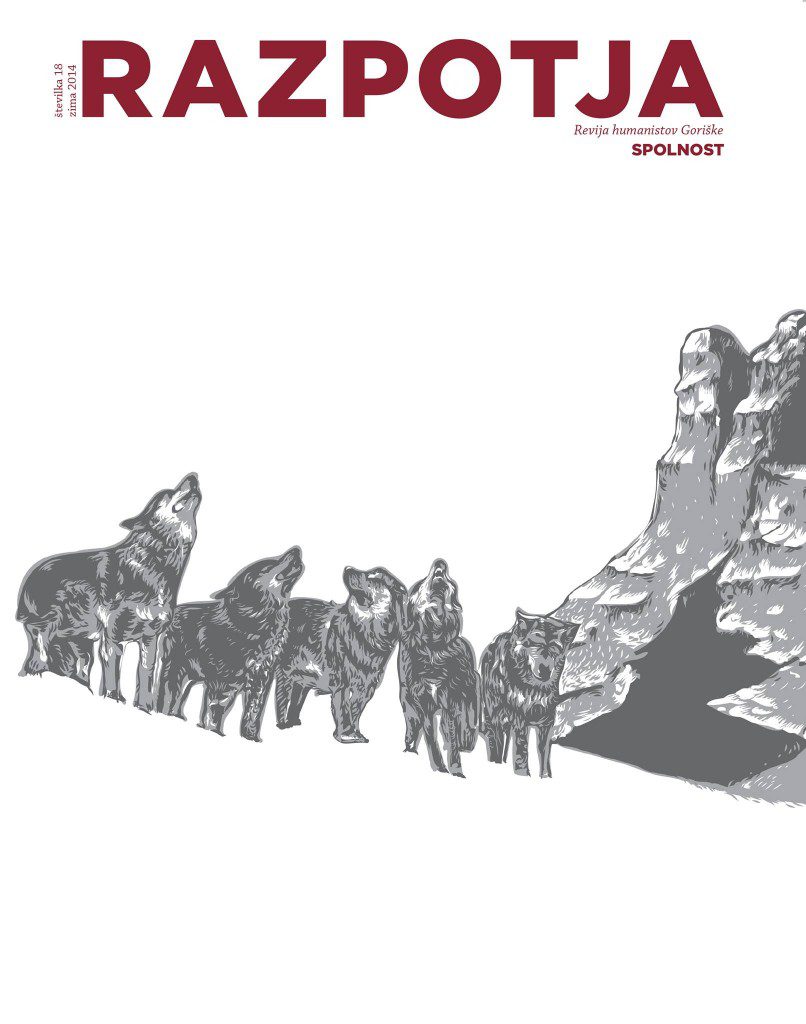 The following is a selection of an essay written for the recent Winter issue of the Slovenian cultural journal Razpotja, which focused on topics in sustainability. If you want the whole essay, you have to learn Slovenian. The essay owes a sizable debt to the author and environmentalist Wendell Berry and his marvelous pieces Feminism, the Body, and the Machine, and The Body and the Earth.
The following is a selection of an essay written for the recent Winter issue of the Slovenian cultural journal Razpotja, which focused on topics in sustainability. If you want the whole essay, you have to learn Slovenian. The essay owes a sizable debt to the author and environmentalist Wendell Berry and his marvelous pieces Feminism, the Body, and the Machine, and The Body and the Earth.
Sexuality and the land both have a life of their own. The land has its soil, weather, insects, and idiosyncrasies of geography all quite apart from the willful decisions of the farmer. Sexuality is lively with cycles, drives, growths and responses that need no permission to operate. This uncalled-for, hormonal, physiological given determines our sex, our shape, the breast, the beard, the hip — and all without a waiver from us. The whole awkwardness of puberty is a painful recognition of this fact, that I contain a life that “goes on without me” – and gives me pimples.

The otherness of the land is being greeted with a new enthusiasm by organic farmers and advocates of permaculture, a philosophy of farming interested in the harmonious and sustainable use of the land. The unasked-for quality of sexuality, on the other hand, remains a source of suspicion. The great moralizing religious and your average advocate of all things “sexually revolutionized” are in agreement here: Both see the otherness of sexuality as a threat to the entire life of the person.
The moralist sees sexual life as encroaching on the life of the spirit, a separate demand of the sinful flesh and an embarrassment within us to be suppressed. The advocate of contraception and abortion sees its cycles and fertility as encroaching on the life of work and fulfillment, a separate demand of “the biology” and an inconvenience to be repressed. Christians who mistake repression for virtue have advocated all manner of methods to render the human drive life under the spiritual thumb — from chastity belts to sex-ed classes preaching the ‘dirtiness’ of the non-virgin. We post-Christian denizens are no better, having subjected sexuality to the power of technology to keep fertility and arousal under the strict control of the rational man. The former advocates mortification, the latter sterilization, but both shudder at the face of an apparent paradox that there is within us that which goes on without us, a life that belongs to us, and yet, terrible thought – we belong to it.
This is why the sexual revolution, though it helped kick Victorianism and gave us the remarkable benefit of actually being able to talk about sexuality, also inaugurated an age of control. Control is our method of making that which has its own life absolutely ours. This is obvious in reference to the state: The totalitarian state controls its subjects, peeling from them that life that goes on apart from the state, implementing techniques of power – secret police, spies, propaganda, and so forth – to finally bring about an end to the uncontrollable private life. So the modern sexual existence, frightened as it is of a life it does not control, implements techniques of power – pornography, menstrual suppression, abortion, surgery, systematic gender theory, and all the rest – to strip sexuality of its otherness, rendering it absolutely subject to our desires.
 And the logical tendency of sexual control really does aim towards this absolute. Trans-humanists dream of “the end of sex” and “the inevitable rise of the artificial womb” (to quote two recent headlines), pining for an absolute control over pregnancy. Well-meaning progressives let children choose their gender, advocating that gender identity be a product of control. The more extreme advocates of contraception look to a future of total fertility control, where, through implants and IUDs, women will be semi-sterile; only ever fertile as a definite choice. Here, everything that presents itself as given, as a possible surprise, is reconfigured under some technique of power so that it becomes the outcome of a willful decision.
And the logical tendency of sexual control really does aim towards this absolute. Trans-humanists dream of “the end of sex” and “the inevitable rise of the artificial womb” (to quote two recent headlines), pining for an absolute control over pregnancy. Well-meaning progressives let children choose their gender, advocating that gender identity be a product of control. The more extreme advocates of contraception look to a future of total fertility control, where, through implants and IUDs, women will be semi-sterile; only ever fertile as a definite choice. Here, everything that presents itself as given, as a possible surprise, is reconfigured under some technique of power so that it becomes the outcome of a willful decision.
If this all sounds wonderfully macho, cutting-edge, and powerful, we ought to recall that the average sexual life fits somewhere on a scale of ‘stressful’ to ‘unendurably frustrating,’ that women appear to be less satisfied and happy after the sexual revolution than before, and that the price of trans-mutating our dominant relationship with our own sexuality into a relationship of the controlling and the controlled has been, paradoxically, an increased dependence on structures of power to maintain this control.
The independence that contraception, sterilization and abortion give us from our fertility is achieved by a simultaneous dependence upon pharmaceutical companies, surgeons, abortionists. The independence pornography gives our sexual arousal from actual encounters with another is achieved by an increased dependence on the pornography industry, on its stars, producers — and slaves. The freedom the ever-growing system of gender theory gives us from binary sexual identities is bought at the price of a dependence on academics to define and validate the pansexual from the omnisexual, the nonsexual from the asexual, the biromantic or the two-spirited from the polyamorous and bisexual. The freedom of divorce is a dependence on the legal system, and the independence surgery gives us from our bodies is simultaneously a dependence on surgeons — and the cash we owe them. Every liberating innovation in the erotic sphere has trailed the chain of an increased dependence on impersonal structures of power behind it. The will to power has made us powerless.
 Now it would be absurd if the farmer took the same tact of stark dominion, saying of the land, “this land which belongs to me nevertheless has a life of its own. I will control that life, and thereby be the sole master of this land. I will no longer be a slave to its ecology. My power will be the sole source of its fruits.” No, the otherness of the land is precisely what enables the farmer to farm. The farmer places his seeds in the soil he did not create, under the sun he cannot command to shine – he uses what is given, and only because it is given as “already going on” can he use it at all. His is a work of cooperation with the land, not sheer mastery over it. Even the most brutally technological agricultural practices, rely, at base, on processes beyond the farmer’s control. Planting crops without rotating them, plowing without regards to the particulars of geography, these efforts abase the unique life of nature, with its cycles, rhythms, and idiosyncrasies, to the monochrome will of man. They are idiotic efforts, ending in dust bowls, for it is the unique life of the land which enables us to use it in the first place. Unsustainable use does not respect the otherness of that which is used. It is a phenomenon of hyper-control, one that denies the life that goes on apart from our power and desire, and thus it ends in destroying the otherness that was the possibility of use in the first place.
Now it would be absurd if the farmer took the same tact of stark dominion, saying of the land, “this land which belongs to me nevertheless has a life of its own. I will control that life, and thereby be the sole master of this land. I will no longer be a slave to its ecology. My power will be the sole source of its fruits.” No, the otherness of the land is precisely what enables the farmer to farm. The farmer places his seeds in the soil he did not create, under the sun he cannot command to shine – he uses what is given, and only because it is given as “already going on” can he use it at all. His is a work of cooperation with the land, not sheer mastery over it. Even the most brutally technological agricultural practices, rely, at base, on processes beyond the farmer’s control. Planting crops without rotating them, plowing without regards to the particulars of geography, these efforts abase the unique life of nature, with its cycles, rhythms, and idiosyncrasies, to the monochrome will of man. They are idiotic efforts, ending in dust bowls, for it is the unique life of the land which enables us to use it in the first place. Unsustainable use does not respect the otherness of that which is used. It is a phenomenon of hyper-control, one that denies the life that goes on apart from our power and desire, and thus it ends in destroying the otherness that was the possibility of use in the first place.
So too, the unsustainable use of our sexuality is really the destruction of the grounds by which we enjoy sexuality in the first place. It is precisely the otherness of sexual arousal, for instance, that makes it enjoyable, the fact that our the body responds to our the beloved without asking permission. This is the adventure, surprise, and danger of erotic feeling – that it cannot neither be forced nor mustered up by the sheer power of choice, but comes as a blessing and a gift. The indulgence of pornography and masturbation makes erotic feeling and sexual pleasure the outcome of our willful decision. It is always chosen, done to oneself, administered in a controlled time and place, with total power over its indulgence, actively opposed to the other-orientated nature of sexuality, and thus to the spontaneity and otherness of erotic feeling. With the advent of Internet pornography, our power to control attains a new height – we sit before an infinite array of possible stimuli, utterly available to our choice. A real person cannot compete with pornography, not because he lacks this or that arousing trait, but because a real person is an other, a unique private life. He resists our growing desire for control by asserting, like the land, a unique life of his own.
But what is the outcome of use which denies the otherness of what is used? The destruction of the very ground by which we experience pleasure in the first place. Our sexuality cannot sustain being reduced to our total control anymore than the soil can sustain a single high-yield crop. More and more evidence is collaborating to show that addiction and erectile dysfunction, not some wild freedom, are the fruits of male pornography use. Pornography becomes boring, pleasure decreases, and the capacity for sexual activity is diminished, for we have destroyed the very means by which pornography was pleasurable in the first place – our erotic feelings responding powerfully to something other than ourselves…















